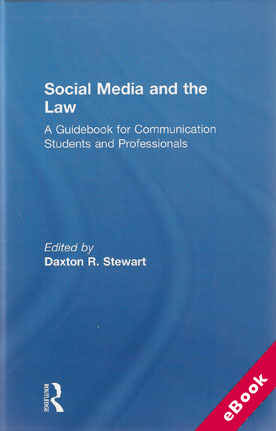
The device(s) you use to access the eBook content must be authorized with an Adobe ID before you download the product otherwise it will fail to register correctly.
For further information see https://www.wildy.com/ebook-formats
Once the order is confirmed an automated e-mail will be sent to you to allow you to download the eBook.
All eBooks are supplied firm sale and cannot be returned. If you believe there is a fault with your eBook then contact us on ebooks@wildy.com and we will help in resolving the issue. This does not affect your statutory rights.
Social media platforms like Facebook, Twitter, Pinterest, YouTube, and Flickr allow users to connect with one another and share information with the click of a mouse or a tap on a touchscreen-and have become vital tools for professionals in the news and strategic communication fields.
But as rapidly as these services have grown in popularity, their legal ramifications aren't widely understood. To what extent do communicators put themselves at risk for defamation and privacy lawsuits when they use these tools, and what rights do communicators have when other users talk about them on social networks?
How can an entity maintain control of intellectual property issues-such as posting copyrighted videos and photographs-consistent with the developing law in this area? How and when can journalists and publicists use these tools to do their jobs without endangering their employers or clients?
In Social Media and the Law, eleven media law scholars address these questions and more, including current issues like copyright, online impersonation, anonymity, cyberbullying, sexting, and WikiLeaks. Students and professional communicators alike need to be aware of laws relating to defamation, privacy, intellectual property, and government regulation-and this guidebook is here to help them navigate the tricky legal terrain of social media.